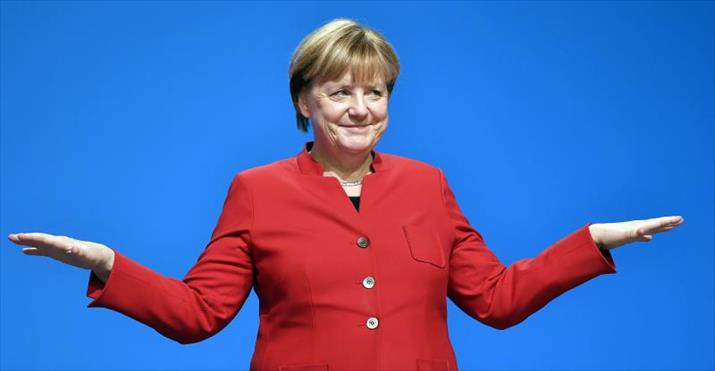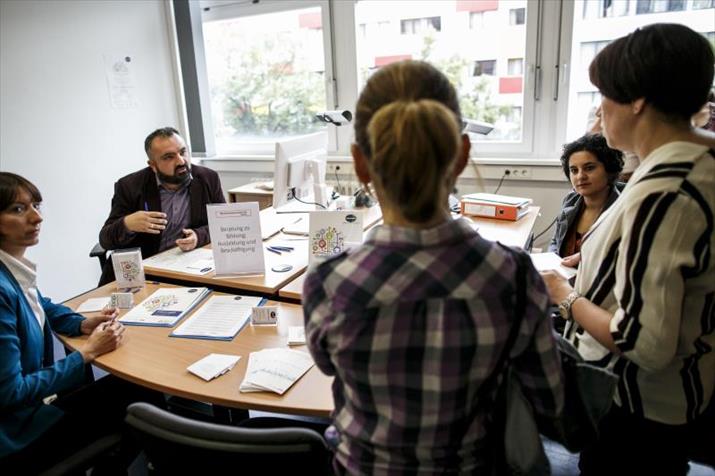| Opinion |
| Merkel's Dilemma | |
| Whether or not to reform Germany's welfare system | |
|
|
 German Chancellor Angela Merkel is reelected as chairwoman of her Christian Democratic Union party on December 6, 2016, boosting her prospects of winning a fourth term in office in 2017 (XINHUA)
After the United Kingdom's decision to withdraw from the European Union (EU), the outcome of the German federal election, one of the EU's pillar members, will have a profound influence on the EU's future. Much of this will depend on whether the winner decides to reform Germany's employment and welfare policies in order to promote economic efficiency.
Undue social policies Presently, the EU is over-regulated in these areas, with policies and rules that are politically correct but which seriously undermine efficiency and distort markets. Take women's representation as an example. Improvements have been significant, but just like any other employees, women should be appointed on merit. Appointing women to positions of power—whether in government or business—according to quotas rather than actual competency and performance is not a show of respect. To fulfill quotas, companies have to promote women to positions which they find hard to handle. When some are found to be lacking competency, people tend to conclude that female executives are incompetent, which is unfair to those who are capable. In 2014, the German Government announced it would require as of 2016 that women must comprise at least 30 percent of the supervisory committees of over 100 large, listed companies. The government also requires Germany's 35 million medium-sized companies to publish annual gender equality reports from 2016 onwards. Such regulations are not conducive to production, but they do increase the corporate burden. Excessive social welfare, meanwhile, has a detrimental effect not only on economic vitality, but also on safety across the whole of Europe. High welfare rates attract large numbers of immigrants and intensifies the economic pressure created by the influx. Since many immigrants are reluctant to merge into the local culture, social division and societal fragmentation increases. Such risks have risen to prominence since the European refugee crisis erupted in 2015. The "ideal" social welfare systems developed throughout the West since World War II have encouraged people to adopt whatever lifestyle they desire, without necessarily forming a family and having children in the usual way. The traditional family structure is facing unprecedented challenges; dramatically declining fertility rates lead to population aging, and consequently, a nation has to let in more immigrants in order to maintain its high living standards and benefits. Among Western powers, such problems are most acute in Germany. Excessive social welfare indirectly intensifies competition for young immigrants, but it also dashes hopes of thereby alleviating the pressure on social security provisions. Social welfare greatly reduces the difficulties for immigrants to live in Germany and so it stimulates more immigration, especially by people who lack the will to work hard. If immigrants could not count on welfare, they would have to work hard to survive and blend in with the host country culture as much and as soon as possible in order to maximize their opportunities. If they expect generous social security provisions, on the other hand, they have much less incentive to work hard. Particularly, if a country offers multiple welfare provisions specifically for immigrants, newcomers will very likely avoid merging into their host country's culture in order to maintain their special status and associated benefits. Given generous social security and a government attitude of "oiling the squeaking wheel," some immigrants, while enjoying enormous benefits they could have never obtained in their own countries, would seek terms still more favorable in their host country so they could become immigrant leaders—a political asset for those who eye government positions. Such a tendency would inevitably stir up more social conflict in Germany and other European countries.  Job consultant Eksoy Sengul sits at a consulting table in a new city welcome center for immigrants on August 18, 2016, in Berlin. The center will assist immigrants and refugees with asylum status in finding jobs, housing and qualification recognition from their previous employment and education (CFP)
Reform in sight? The employment and social welfare systems of Germany and the entire EU must be profoundly reformed, but are they ready for the reform, and do their existing systems encourage such reform? The answers are not optimistic. The European Court of Justice ruled on November 11, 2014 against "welfare tourists" and made clear that member states have the right to refuse granting social welfare benefits to foreign nationals not seeking employment. But, this ruling failed to address both the conditions that attract non-genuine refugees to the EU and the practice of giving special treatment to refugees and thereby discriminating against local citizens. Worse still, the existing political systems of Germany and some other EU countries discourage politicians from taking society's long-term interests into consideration when choosing policy direction and promoting change, a fact amply demonstrated by former German Chancellor Gerhard Schröder's reforms and his consequent failure to be reelected. In the sub-prime and sovereign debt crises which have swept the globe since 2008, the United States and Europe were the sources of the problem, and among the world's developed economies, Europe has been particularly afflicted. Germany, however, is one of the few European countries that have maintained sound economic performance, with exports and government tax revenue continuing to rise and record-high employment. Germany has achieved such outstanding performance mainly because, besides China's robust demand for German technology, the country has carried out painful but necessary reform of its social welfare and employment systems over the past decade. In early 2003, the German economy was mired in difficulties: The economy had stopped growing since the autumn of 2000; the number of jobless people totaled 4 million; population aging was accelerating—putting state pension and medical budgets under heavy pressure—and government expenditure and national debt were ballooning. Capital kept flowing out of the country, and illegal workers posed a serious challenge to locals in terms of competition for jobs. Recognizing the ills the social welfare system had accumulated over the past several decades, Schröder overrode all dissenting views and began to implement in March 2003 his Agenda 2010, which focused on reforming the unemployment benefit scheme to reduce dependence on public welfare and to encourage people to assume more individual responsibility. Measures included: gradually cutting the maximum length of unemployment benefit from 32 months to 18 months; advancing a compulsory reemployment system and carrying out the Hartz IV reform; abolishing various restrictions on casual work and encouraging the unemployed to take on "mini jobs" with annual salaries below 400 euros; raising the state pension age; cutting tax rates to stimulate investment; and increasing expenditure on education, research and development to improve productivity. The reform was aimed not at destroying the welfare system, but at increasing employment, boosting economic growth and ultimately better retaining the essence of the welfare state and consolidating the system's foundations. The effects of the reform were fully demonstrated during the crisis 10 years later, and the highly disputed Hartz IV reform produced particularly outstanding results in reducing unemployment. In October 2010, the jobless population in Germany dropped below 3 million, 1 million lower than the figure in 2003. In 2012, Germany's unemployment rate—5.9 percent—was the fourth lowest in Europe, above only those of Austria, the Netherlands and Luxembourg. Schröder and his Social Democratic Party were widely opposed, however, as they seriously challenged people's inertia. Even in March 2013, 10 years after the instigation of Agenda 2010, 43 percent of respondents in a poll conducted by German news magazine Stern still expressed reservations about or opposition to the Hartz IV reform, saying that the reform had widened the gap between rich and poor. In the 2005 election, Schröder was defeated because most voters from the middle and low income groups supported the Social Democratic Party's rivals. Such an outcome has created a lack of public confidence in the ability of Germany and the EU to carry out further reforms. The author is an op-ed contributor to Beijing Review and a researcher with the Chinese Academy of International Trade and Economic Cooperation Copyedited by Chris Surtees Comments to liuyunyun@bjreview.com |
|
||||||||||||||||||||||||||||
|
